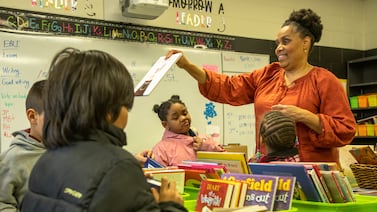With the Illinois legislative session at its midway point, bills targeting literacy, full-day kindergarten, and the informal removal of students with disabilities from school appear to have gained momentum in Springfield.
Lawmakers, who are off for spring break this week, have debated hundreds of bills over the last couple of months. Some have moved from one chamber to the next, while others have not been brought to a floor vote in either the House or Senate — which means that they don’t have a pathway to Gov. J.B Pritzker’s desk.
Chalkbeat Chicago has been following bills related to school funding, early childhood education, and teacher training during this session. But other issues also have gained traction, including an anti-book banning bill, a requirement to teach Native American history in schools, and a bill to require full-day kindergarten.
Here is an update on what Chalkbeat Chicago is tracking:
Bills that are moving:
Anti-book banning bill: Amid a conservative-led push to challenge books about race and LGBTQ issues, House Bill 2789 stands out. It would prevent libraries and library systems from banning books, or risk losing state grants. This bill has moved from the House to the Senate.
Native American history curriculum: House Bill 1633 will require schools to teach Native American history in every social studies course related to American history or government. Students in sixth to 12th grade will study genocide and discrimination against Native Americans as well as tribal sovereignty and treaties made between tribal nations and the United States. This house bill is currently in the Senate.
Task force on children’s mental health: In February, Pritzker spoke about the need to bring together state agencies that focus on children’s mental health to make it easier for families to navigate and access state resources. To address this concern, Senate Bill 0724 would create the Interagency Children’s Behavioral Health Services Act and require the state to establish a Children’s Behavioral Health Transformation Officer who will lead the state’s efforts to work across state agencies to make it easier for families to access services. This bill has moved from the Senate and is in the House.
Decreasing transfers to alternative schools: To ensure families are aware of a student’s rights when being transferred to an alternative school, Senate Bill 0183 would require school districts to create an “Alternative School Bill of Rights.” The bill of rights would include information about the alternative school program, such as the curriculum, number of students, a typical daily schedule, and extracurricular activities. The bill also requires a transition meeting at least 30 days prior to a student transferring back to a traditional public school. This bill is currently in the House’s rules committee.
Full-day kindergarten: Illinois allows school districts to provide either half-day or full-day kindergarten programs for young learners. If passed, House Bill 2396 will require school districts to provide full-day programs by 2027-28 school year — instead of 2023-24 in an earlier version of the bill. The bill will also create a task force to conduct a statewide audit of kindergarten programs and offer recommendations to the state board of education. This bill passed through the House and is currently in the Senate.
Creating a statewide literacy plan: Senate Bill 2243 will require the state board of education to develop and adopt a comprehensive literacy plan for the state between Oct. 1 and Jan. 31, 2024. This bill sailed through the Senate with no opposition and is currently in the House.
Reporting informal removals of students with disabilities: House Bill 3600 will require schools to send a written notice to parents if students are sent home early during the school day, given in-school suspension, or told not to come to school. If a student with disabilities is removed from school 10 times during the school year, the school must hold a meeting with the student’s individual education program team or Section 504 plan team to discuss or create a behavioral intervention plan. This bill is currently making its way through the Senate after passing the House.
Bills with uncertain futures:
Supporting school-age migrant youth: In the fall, Texas officials bused hundreds of people who crossed the U.S-Mexico border to Illinois — many are school-age children. To support migrant students, House Bill 2822 would require the state board of education to create a new grant program for public schools. This bill did not make it out of the House’s appropriations for elementary and secondary education committee.
Screening children for dyslexia: Companion bills in the House and Senate would require public schools to screen students for dyslexia in grades K-2, starting with the 2023-24 school year. The bill would have also required the state board of education to create guidelines in the dyslexia handbook to screen children for dyslexia and other reading difficulties. While the House bill moved out of committee, it was not called for a vote on the House floor. The Senate version of the bill has also not moved out of committee.
Other bills supporting students’ mental health: There are several bills focusing on students’ mental health that have not moved in Springfield. House Bill 3361 would have required the state board of education to establish a new grant program for schools. House Bill 1234 would have required all schools to post information about mental health resources offered by the school and state. House Bill 1243 would have created a mental health course for students in grades K-12 during the 2024-25 school year. And House Bill 1107 would require schools to develop and implement a plan to support students who have experienced traumatic events. None of these bills have moved out of committees in the House.
Samantha Smylie is the state education reporter for Chalkbeat Chicago, covering school districts across the state, legislation, special education, and the state board of education. Contact Samantha at ssmylie@chalkbeat.org.







